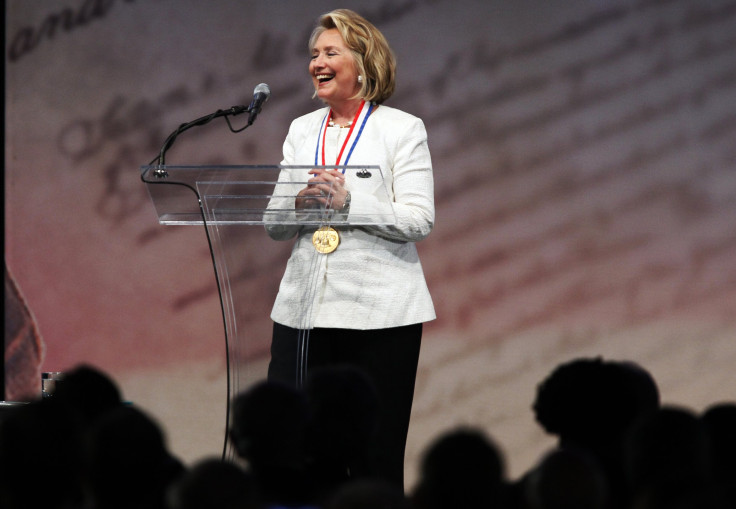Hillary Clinton Praises Bipartisanship But Dodges Tough Issues In Philadelphia Speech

Former Secretary of State Hillary Clinton called for an active citizenry and the need for bipartisan debate over partisan gridlock in a speech Tuesday, largely avoiding the controversial debates over the war in Syria and domestic surveillance issues that have dominated the news in the last few days.
Clinton paid lip service to the pressing questions of the day: how the United States should respond to the use of chemical weapons -- the question at stake in Syria -- and how it should balance the need for both liberty and security. But she did not offer any concrete answer on these highly divisive questions.
The use of chemical weapons “demands a strong response from the international community led by the United States,” Clinton said. “This debate is good for our democracy.”
Clinton’s remarks at the National Constitution Center in Philadelphia, where she accepted the group’s 2013 Liberty Medal award, came shortly before President Obama was scheduled to speak to the nation about the situation in Syria in a rare Oval Office address.
Clinton's speech went on to address the need for working together, across the aisle, to get things done -- a topic that is salient given the gridlock in Washington today but also uncontroversial. “When we fail to make progress on the challenges facing our people at home, our standing in the world suffers,” she said.
Clinton has stayed in the public spotlight since leaving office earlier this year and is setting out her policy positions on a number of issues through a series of public speeches. At an event in San Francisco in August, Clinton discussed voting rights, decrying the Supreme Court’s recent ruling against a key portion of the 1965 Voting Rights Act and declaring that racial discrimination continues to be a factor in elections.
Though Clinton has not yet announced whether she will seek the Democratic nomination for president in 2016, speculation about her next move is the subtext of everything she does. Even at Tuesday’s event, hosted by a nonpartisan group, the idea of a woman president was mentioned numerous times. Philadelphia Mayor Michael Nutter said in his introductory remarks that he expected Clinton “will be the first first lady to walk back into the White House in her own right as president of the United States of America.”
If Clinton decides to run, she will ultimately have to address the hard issues she merely alluded to Tuesday.
© Copyright IBTimes 2024. All rights reserved.






















